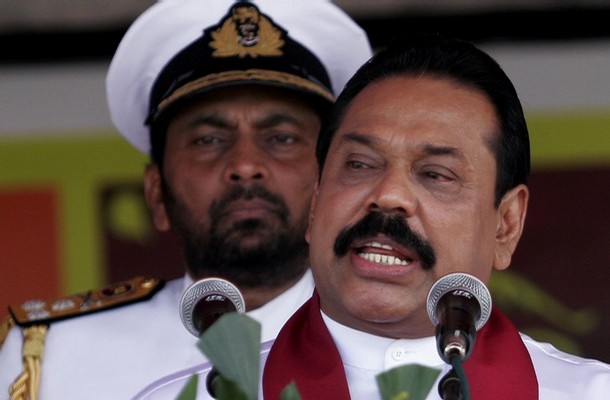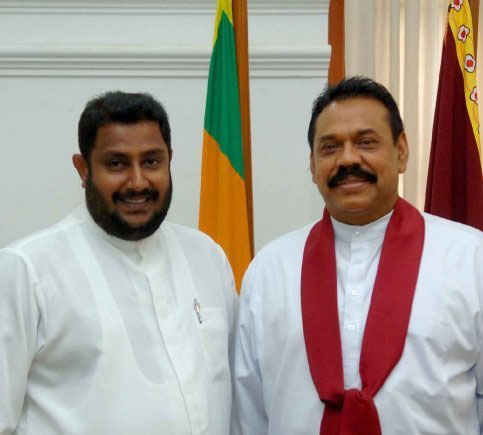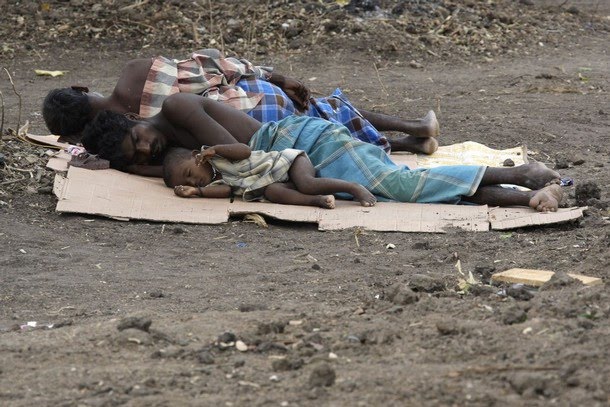
By Paul Tighe - Sri Lanka is facing a conspiracy to devalue its achievement of defeating the Liberation Tigers of Tamil Eelam and ending the group’s 26-year fight for a separate Tamil homeland, President Mahinda Rajapaksa said.
There is “conspiracy after conspiracy to downgrade the heroic feat achieved by the armed forces,” Rajapaksa said, according to a statement on the government’s Web site.
Sri Lanka has been criticized for keeping more than 280,000 Tamils displaced by the civil war in camps since the last LTTE forces were routed in May on the northeastern coast. The government says people will be resettled after mines are cleared from former conflict zones and the northern region is secure.
Sri Lanka isn’t making the expected progress toward a lasting peace since the defeat of the Tamil Tigers, Lynn Pascoe, the UN’s political chief, said last week at the end of a visit to the South Asian island nation to press for a swift release of displaced people from camps.
Western nations should help Sri Lanka rebuild after the war and stop criticizing the country over human rights and the treatment of displaced people, Rajapaksa said earlier this month in an interview with France’s Le Figaro daily newspaper.
Rajapaksa’s government and the Tamil Tigers have been criticized by the UN over alleged human rights abuses during the conflict. A UN envoy last week called for an independent investigation into whether a video that may show the army executing nine people is authentic.
The government has said it will cooperate with any UN probe and that four investigations it has carried out show the tape is a fake.
Taking Orders
Soldiers fought bravely to end the war, Rajapaksa said, adding they took orders from him and he will appear before any judiciary on their behalf. The president was speaking at the weekend in the capital, Colombo, according to the government’s Web site.
Rajapaksa told Pascoe when they met on Sept. 18 that the resettlement of internally displaced people should be completed by the end of January. The process does depend on mine clearing, he added.
“We understand there are security concerns,” Pascoe said after the meeting, according to the UN. “At the same time, this kind of closed regime goes directly against the principles under which we work in assisting IDPs all around the world.”
People aren’t free “to come and go and they are understandably upset,” said Pascoe, who visited camps in the north last week, including Manik Farm near Vavuniya, the center holding the most refugees.
The government says it must undertake security checks of displaced people after receiving information that Tamil Tiger fighters infiltrated the camps.
“If there is more screening to do it should be speeded up,” Pascoe said. “It appears there are areas where de-mining is not a big concern. For those areas, families who have passed the screening process could be resettled without much further delay.”
© Bloomberg
Tuesday, September 22, 2009
"Soldiers took orders from me" - SL President
Tuesday, September 22, 2009
"I can shoot with both hands" says a ruling party candidate

"If I am elected, I will be the only chief minister who could shoot with both hands, except Chief Minister in the East" said a ruling UPFA candidate for the upcoming Southern Provincial Council election.
Speaking at a press conference Mr. Nishantha Muthuhettigama said, “I would worship at the feet of the President. I’d even go to courts to get police powers to provincial councils. We would get the 13th amendment fully implemented one way or another. The President should be prepared to give the rights we are entitled for."
Speaking futher he said "after I become the chief minister, I will prepare a code of ethics for children during the first three months. I will make a legal code and change the existing laws. The graduates in the SL Army will be trained and appointed as principals of schools."
Noting that he would sit on the ‘Big Chair’ of the Southern Provincial Council, Mr. Muthuhettigama further said that the next Chief Minister of the Province is capable of ‘shooting with both hands’.
“I was a school cadet. My school has all those records. Except Chief Minister Pillayan in the East, the next Chief Minister of the South would be able to shoot with both hands. But I would not shoot anyone,” he said.
He said that the ruling UPFA would win Galle district and even the President would vote in the south to make him the Chief Minister.
“We know his pulse. We know how he works,” he said.
Related Links:
Sri Lankan politician arrested for slamming police - Xinhua
Tuesday, September 22, 2009
CCD obtains statement from a leading human rights lawyer

Attorney at Law J. C. Weliamuna says that the Colombo Crimes Division (CCD) obtained a statement from him yesterday.
He added that the statement was regarding the threats leveled against the Executive Director of the Centre for Policy Alternatives, Dr. Paikiasothi Saravanamuttu.
© Newsfirst
Related Links:
Dr. Saravanamuttu receives death threat - CPA
Tuesday, September 22, 2009
Sri Lanka under fire for lack of Tamil reconciliation

By Mian Ridge - When Sri Lanka's government finally defeated the secessionist Liberation Tigers of Tamil Eelam (LTTE) in May, even its harshest critics rejoiced. Here, at last, was a chance to bring peace to an island that had suffered 26 years of war, in which as many as 100,000 people were killed.
The end of the war gave Sri Lanka an opportunity to heal the bitter ethnic conflict between the Sinhalese majority and Tamil minority that had fueled it. But even as the government says it seeks reconciliation, it is drawing fire for actions that appear counterproductive to achieving that goal.
Chief among the complaints is delaying the return of more than 250,000 displaced Tamils. They have been refused permission to return to their homes or, in many cases, unite with spouses and children living in other camps. In addition, aid agencies have been given limited access to the camps and most reporters have been barred.
Last Friday, President Mahinda Rajapaksa announced he would ensure the return of all refugees by January, after demining operations were completed in the areas around their homes. The government has also said it wants to ensure that it identifies any Tamil militants among the displaced before allowing them to go home.
Mr. Rajapaksa's assurances came during a meeting with UN envoy Lynn Pascoe, who was visiting the country to follow up on a number of issues including the government's expulsion of James Elder, a spokesman for UNICEF – the United Nations' child-welfare agency.
The government said Mr. Elder, who had said recently that the island's monsoon rains would cause chaos in the camps, was "spreading propaganda." During the final, most bloody stage of the war earlier this year, Elder had described the "unimaginable suffering" of children caught in the fighting, including babies he had seen with shrapnel wounds.
In August, heavy showers had caused latrines in the camp to overflow, heightening concerns about the spread of contagious diseases.
Jehan Perera, executive director of the National Peace Council of Sri Lanka, a nonpartisan advocacy group, says that at least three children died in one camp in August, "which shows the sense of what [Elder] was saying."
Treating every Tamil as a terrorist?
After Sri Lanka gave Elder a Sept. 21 deadline for leaving the country, the office of UN Secretary-General Ban Ki-Moon said that the organization was "working impartially to assist the people of Sri Lanka." This included "making public statements when necessary in an effort to save lives and prevent grave humanitarian problems."
Elder reportedly left the country Sept. 18, marking the first expulsion of a UN worker from Sri Lanka. Many see it as yet another example of the government's intolerance of any criticism of its tactics either during or after the war.
But more worryingly, the government's apparent conflation of the defense of the rights of ordinary Tamils with LTTE propaganda suggests an unwillingness to tackle Tamil grievances – without which peace will be difficult, if not impossible.
"It seems absolutely racist, to treat every Tamil as if he was a potential member of the Tamil Tigers," says Suhas Chakma of the Delhi-based Asian Center for Human Rights.
Human rights abuses
In late August, President Rajapaksa told Forbes magazine, "I want to be the leader who brings permanent peace and development to this country," as well as reconciliation with Tamil communities, he added.
But even as the government promises to bring reconciliation, in recent weeks a series of alarming reports have come out of Sri Lanka. Tamils, who constitute around 12 percent of the population of 20 million, have endured decades of institutionalized discrimination at the hands of the Sinhalese.
Only days before Mr. Rajapaksa's comment, British television aired a video that apparently showed soldiers killing unarmed, naked, and blindfolded Tamils – which would constitute a serious violation of international law – during the last and bloodiest phase of the war.
The footage was obtained by Journalists for Democracy in Sri Lanka, an organization made up of several dozen expatriate Sri Lankan journalists, which said the film was taken by a Sri Lankan soldier in January using his mobile phone.
The government has said the footage is "doctored." But Philip Alston, the UN's special rapporteur on extrajudicial, summary or arbitrary executions, has said he hoped the UN would open an investigation into the video.
Political settlement
Less dramatic but equally important, the government is also failing to develop a long-promised political settlement for the Tamils.
That settlement – which is included in the country's Constitution and widely accepted as a vital condition for peace – involves giving Tamils some measure of regional devolution.
But Rajapaksa said recently he would delay that solution until after his reelection, which may happen next year.
It is not surprising that Rajapaksa feels no sense of urgency. An ardent Sinhalese nationalist, his popularity ratings have soared since the Tigers were vanquished. The government has said the economy is expected to grow by 5 percent this year – double what was previously expected, after the International Monetary Fund agreed to a $2.6 billion loan. And tourist numbers are beginning to pick up.
Nor is Rajapaksa is likely to be swayed by international pressure. Sri Lanka is expected to lose a valuable trade concession granted by the European Union after it failed to meet its terms, which include stipulations on human rights. But Sri Lanka has forged friendships with other parts of the world, including China, Libya, and Pakistan, thus reducing its economic dependence on Europe and the US.
In the end, says Mr. Perera, the only thing likely to change the government's behavior is democracy. As more elections are held in Tamil-heavy areas once ruled by the LTTE, the government, "will need to build up Tamil votes," he says. "At the moment the government does not see the price it will have to pay [for its treatment of the Tamils] but it will have to pay – and that, we hope, will make it change."
© Christian Science Monitor
This site is best viewed with firefox

Search
Is this evidence of 'war crimes' in Sri Lanka?
Archive
- ► 2010 (1312)
- ► 2011 (687)
Links
- Reporters Sans Frontières
- Media Legal Defence Initiative
- International Press Institute
- International News Safety Institute
- International Media Support
- International Freedom of Expression eXchange
- International Federation of Journalists
- Committee to Protect Journalists
- Asian Human Rights Commission
- Amnesty International















